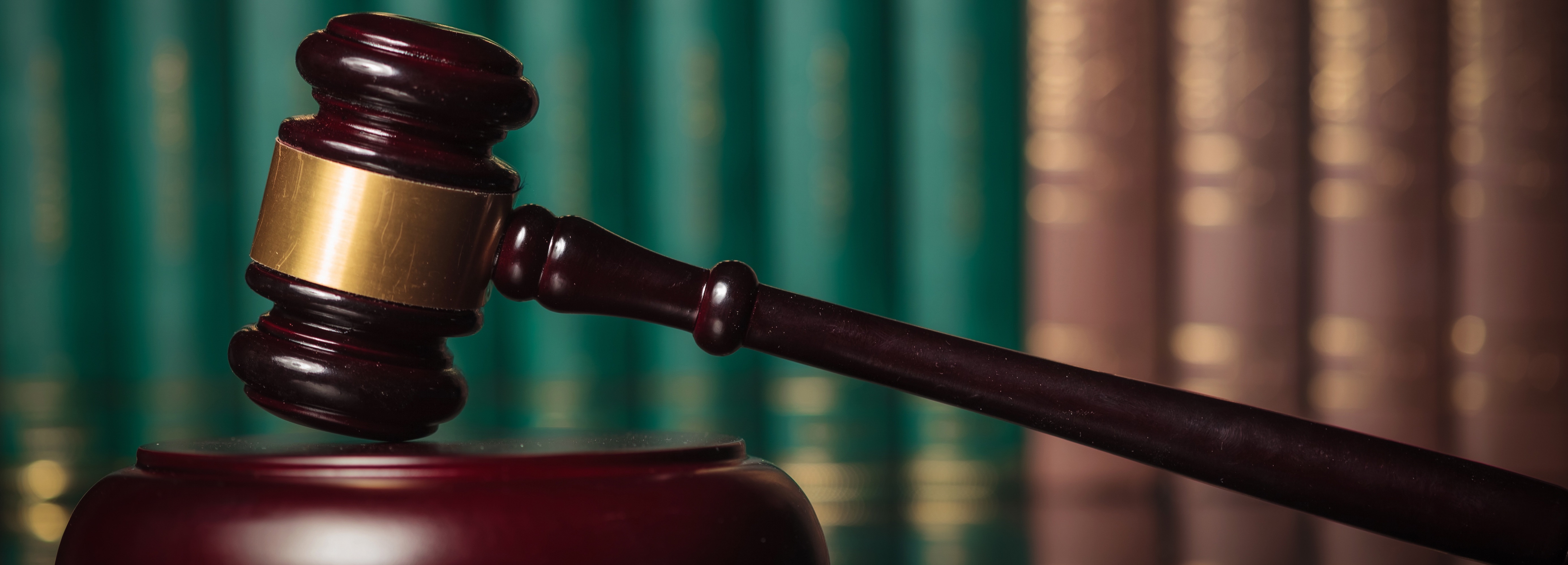In the modern world, as you already know, danger is potentially everywhere. A ride down the highway, a simple surgical procedure, or a household repair – these are everyday activities that could lead to a fatal traffic collision, a medical malpractice tragedy, or a fatality caused by a dangerous product. When you suddenly and accidentally lose someone you love because of someone else’s negligence, no amount of money can alleviate your suffering. However, a wrongful death lawsuit may at least provide the resources for your family to move forward without financial hardship.
If someone’s death is the direct result of the negligence of another person or persons, in most cases the surviving family members may pursue a civil lawsuit and seek damages from that other person or persons. As Chicago wrongful death attorney Joseph M. Dooley explains, “When a family member loses a loved one due to someone else’s negligence, it hurts deeply on so many levels. It is my job to counsel and guide the family through this very tough emotional experience and make sure they are properly and vigorously represented as they seek answers regarding why and how this happened and proper compensation for their loss.”
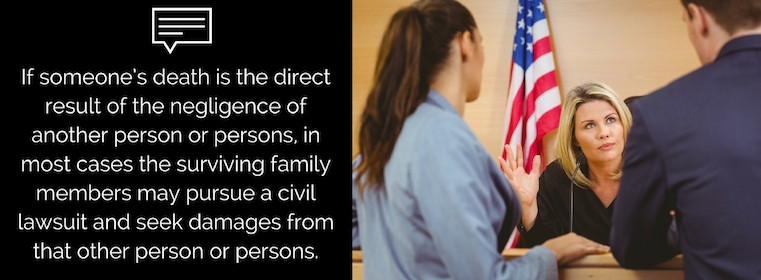
A wrongful death claim is a civil lawsuit for monetary damages. The person who brings a civil lawsuit is called the “plaintiff.” In a wrongful death case, the plaintiff is typically a close family member of the deceased who pursues the claim on behalf of all the deceased person’s heirs. In some cases the actual plaintiff, acting on behalf of the deceased’s heirs, is the court-appointed executor or personal representative of the deceased person’s estate. The person or party against whom the lawsuit is brought is called the “defendant.” A wrongful death lawsuit will claim that the defendant’s negligence was a cause of the untimely, wrongful death of the deceased person.
WHAT MUST A PLAINTIFF PROVE IN A WRONGFUL DEATH CASE?
Most wrongful death claims are settled without a courtroom trial. The attorneys who represent both sides are usually able to negotiate a settlement out of court that is acceptable to both sides. When a wrongful death lawsuit goes to court, the plaintiff must prove the “elements” of the wrongful death claim in order for the lawsuit to prevail. Generally speaking, those elements are the duty of care, the breach of the duty of care, and the causation of death:
- Duty of Care: In a wrongful death case, the plaintiff first must prove that the defendant owed the deceased person a “duty of care.” For instance, in the case of a wrongful death in a traffic accident, the plaintiff must show that the defendant had an obligation to obey the traffic laws and to drive carefully and safely.
- The Breach of Duty of Care: Secondly, a plaintiff must demonstrate that the defendant breached the duty of care owed to the deceased person. If the wrongful death was a traffic fatality, the plaintiff must prove that the defendant breached the duty by driving without ordinary care, speeding, running a stop sign or signal, or otherwise failing to obey the traffic laws.
- Causation of Death: Finally, a plaintiff must prove that the breach of the duty of care was a cause of the wrongful death.
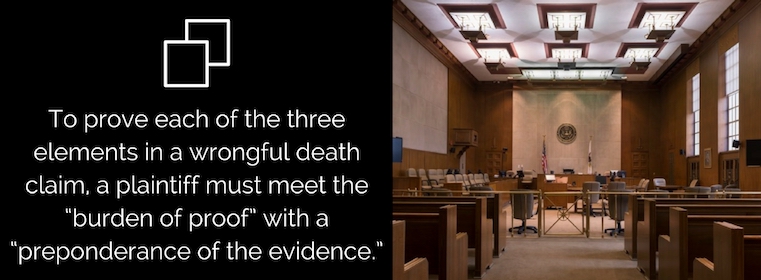
To prove each of the three elements in a wrongful death claim, a plaintiff must meet the “burden of proof” with a “preponderance of the evidence.” In other words, the plaintiff must prove that the deceased person “more likely than not” died because of the defendant’s negligence. The burden of proof in civil cases is therefore somewhat lower than the burden in criminal cases, where the standard is proof “beyond a reasonable doubt.”
IN WHAT WAYS DO WRONGFUL DEATHS HAPPEN?
A wrongful death lawsuit may be the appropriate response to a number of scenarios – not only traffic fatalities. If an incident of medical malpractice results in a patient’s death, the patient’s family may file a wrongful death claim. A slip-and-fall from the balcony of a hotel or office building due to a damaged safety railing is a wrongful death. Defective consumer products – everything from defective pharmaceutical prescriptions to lawn mowers and kitchen appliances to the cords on a “hoodie” – cause a number of wrongful deaths, especially children’s deaths. Wrongful deaths happen every day, in almost every way and in almost every conceivable setting.
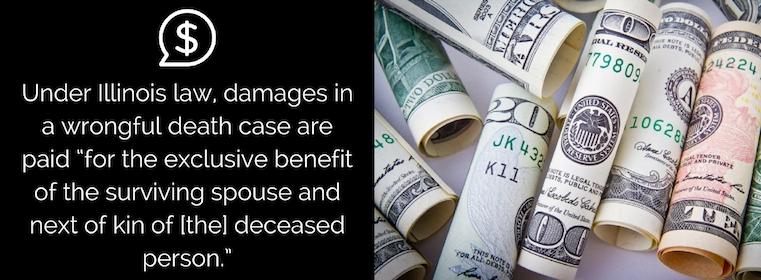
Under Illinois law, damages in a wrongful death case are paid “for the exclusive benefit of the surviving spouse and next of kin of [the] deceased person.” A civil jury may award damages for loss of love, affection, companionship, guidance and support and loss of consortium to the spouse. They may also seek damages for grief, sorrow, and mental suffering, to the surviving spouse and next of kin of such deceased person.” Surviving family members may seek both economic and non-economic damages after the wrongful death of a family member.
Economic damages include the financial support, earning capacity, and other tangible benefits the deceased person would have earned and provided to family members over the remainder of an average lifespan. Non-economic damages may also be awarded to compensate surviving family members for their loss of love, affection, companionship, guidance and support, loss of consortium to the spouse, and for their own pain and suffering.
HOW QUICKLY DO SURVIVORS NEED TO ACT?
It will be emotionally difficult for any family, after the loss of a precious loved one, but you must consider filing a wrongful death claim as quickly as you possibly can after a wrongful death. Under Illinois’ statute of limitations, in some cases, the surviving family members have only one year from the date of the wrongful death to take legal action. In other cases the surviving family members have two years from the date of the death to bring a wrongful death action. In most cases, an experienced wrongful death attorney can quickly determine if surviving family members have legal grounds to file a wrongful death claim and have sufficient evidence for that claim to prevail.
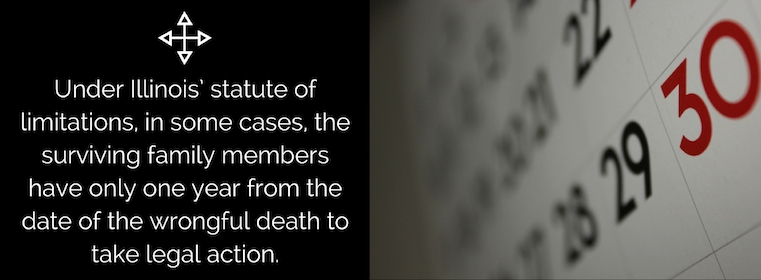
A family’s first step after a wrongful death is obtaining sound legal advice and insights from Chicago wrongful death attorney Joseph M. Dooley, who has more than 25 years of experience representing families in wrongful death cases and fighting for justice on their behalf. Contact wrongful death attorney Joseph M. Dooley by email at [email protected] or call his law offices at 312-236-7282 as quickly as you can after a loved one’s wrongful death in the greater Chicago area.

